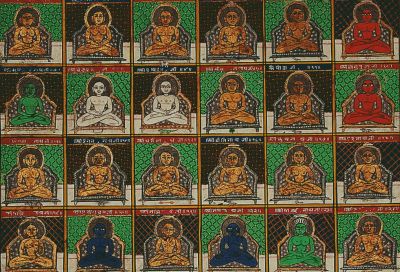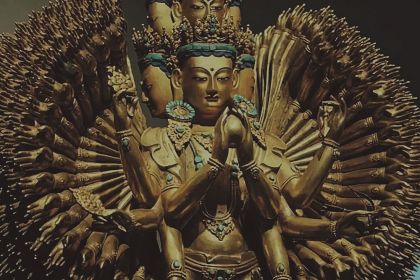MEDITATION
Navkar Mantra: meaning and concept behind the most essential Jains chant

24 Tirthankaras
Chanting or reciting of the Navkar Mantra is a fundamental spiritual practice of Jainism, an ancient Dharmic religion that originated on the Indian subcontinent around the 11th century BCE. Just like Buddhism and Hinduism, the Jain teachings are focused on achieving a special state of consciousness that relieves practitioners of a continuous chain of rebirths by immersing them in nirvana which means omniscience and eternal bliss.
Jain cosmology postulates an infinite universe where time moves in a circle like a wheel, creating periods lasting millions of years, with twenty-four sages known as tirthankaras born in each of these cycles to instruct followers on their path to enlightenment. It is believed that the first tirthankara of present cosmic age helped people organize in communities, while the latest was a real person who lived during the time of Gautama Buddha. The next spiritual teacher of the new cycle is said to be born in 80,000 years.
As in popular Buddhist chants, the Navkar Mantra or the Namokar Mantra is an appeal to supreme souls in various forms of their evolution with the purpose of demonstrating the practitioner's respect for those who are spiritually more developed.
The first five lines of Namokar Mantra literally mean:
- I bow to the Arihants (liberated souls who are still enclosed in human forms)
- I bow to the Siddhas (completely liberated souls)
- I bow to the Acharyas (the spiritual leaders)
- I bow to the Upadhyayas (the term implies mentors and ascetic teachers)
- I bow to all the Sages of the world
The four lines that follow after the five-fold salutation state that it completely absolve one of all sins, and the mantra itself is the foremost auspicious mantra.
Listen to the Navkar Mantra performed by Jain Gundecha Brothers:
Here are the lyrics of the Navkar Mantra:
Om Namo Arihantanam
Om Namo Siddhanam
Om Namo Ayerianam
Om Namo Uvjainam
Om Namo Looye Saava Saunam
Yesi Pancha Noma Kkaro
Saava Pava Panasano
Mangala Namche Saavesingh
Padamam Havai Mangalam
Since Jainism comes from India, the melody of the Namokar Mantra is most often set to ragas of Indian classical music such as Raag Ahir Bhairav or Raag Darbari.



